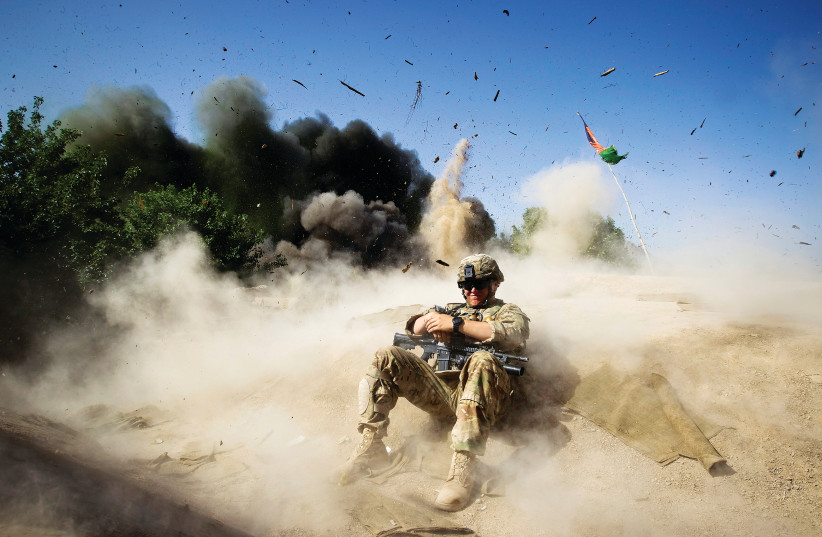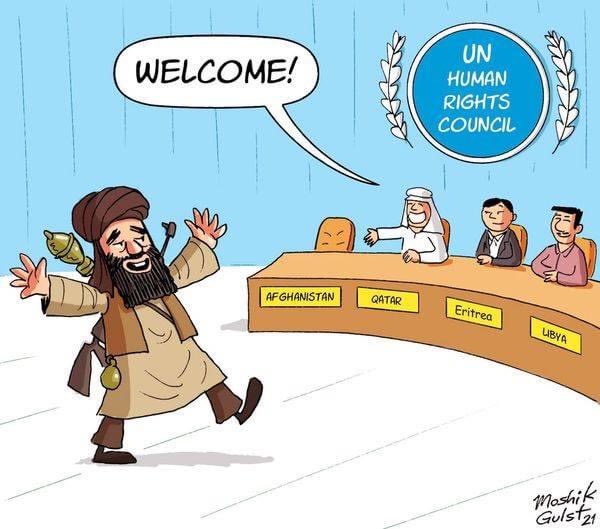Jonathan Tobin: Can the West be honest about the Islamist threat?
That fact notwithstanding, since 2001, Americans have been preoccupied with the idea that Islamophobia is our greatest worry with respect to conflicts in the Middle East. But while any instance of prejudice against Muslims is deplorable, that has produced a mindset that has seemed to argue that anyone who speaks the truth about radical Islam and those who enable it are Islamophobes. Indeed, in one of the worst such instances, the Anti-Defamation League – the organization tasked with defending Jews against anti-Semitism – actually opposed Secretary of State Mike Pompeo's nomination for the post.Durban IV: Take a Stand Against Hate
They claimed that he was an Islamophobe because he called upon American Muslims to condemn acts of terror committed by Islamists. Groups like the Southern Poverty Law Center also regularly smear those who are honest about the Islamist threat as bigots.
The left is preoccupied with criticisms of American conservatives with whom they have disagreements on many domestic political issues and whom they have falsely accused of waging a "war on women." And yet, liberal groups are curiously unenthusiastic about calling out those who are waging an actual war on women such as the government of Iran and other Islamists.
Just as some who deplore terrorism seem to exclude Palestinian terror against Israel from their concerns, the same people are more concerned that the Jewish state's liberal policies that ensure freedom for gays be used as a reason – what they call "pinkwashing" – to refute attacks on the legitimacy of Zionism.
The result is that discourse about the subject has become hopelessly distorted, and the misogyny, homophobia and anti-Semitism that is normative in most of the Muslim and Arab worlds is downplayed or ignored. That makes a mockery of any attempt to stir up advocacy for human rights in countries dominated by Islamists simply because to speak up exposes those who do so to false charges of prejudice.
The willingness of too many to give a pass to members of the left-wing congressional "Squad" because two of them are Muslims – Reps. Ilhan Omar (D-Minn.) and Rashida Tlaib (D-Mich.) – for their anti-Semitism and relative silence about the fate of their co-religionists under the thumb of groups like the Taliban, Hamas, Hezbollah and their Iranian allies do more to undermine human-rights advocacy than anything said by their critics.
The fall of Afghanistan and the abandonment of its people to the tender mercies of Islamists are a reminder that the struggle against those who are a real threat to the rights of women and minorities must involve a frank discussion about what it is that we oppose and why. As long as we fail to note that the oppression that these illiberal groups promote is rooted in a popular version of their faith, we will fail to help those under their power and to prevent the further spread of this illiberal movement.
Noah Rothman: The Worst Presidential Dereliction in Memory
We have placed the fate of untold thousands of Americans and our Afghan allies in the hands of the Taliban. They dictate the terms and tempo of our operations. We depend on the Taliban to allow foreign nationals and credentialed Afghans into Hamid Karzai International Airport. According to what remains of the American diplomatic presence in Kabul, “the United States government cannot ensure safe passage” into the airport. We are dependent on the beneficence of a theocratic militia that has demonstrated no capacity for mercy. And the U.S. government has no intention of remedying this condition.Melanie Phillips: After America
When pressed as to why America’s withdrawal strategy involved the sacrifice of the capable Bagram Airbase in favor of a much smaller commercial airport, Gen. Milley insisted that this was a better “tactical solution in accordance with the mission set that we were given and in accordance with getting the troops down to about a 600, 700 number.” In translation, either civilian or military leadership wanted the U.S. footprint in Afghanistan to be so small as to be incapable of defending an installation as large as Bagram, so it had to be abandoned. That has proven terribly insufficient to the scale of what we’re trying to pull off. So, we’re going to remedy the condition now that we have upward of 4,500 soldiers back on the ground facilitating evacuations, right? Wrong.
When pressed as to why the operation to retake Bagram and expedite the exfiltration of American personnel and allies isn’t already underway, Milley stumbled. “Good question,” he stuttered. “Great question. But I’m not going to discuss branches and sequels off of our current operation. I’ll just leave it at that.” We can assume that the mission to redeploy troops in numbers sufficient to get Americans out in a timely manner isn’t underway because Joe Biden will not authorize it.
Time is of the essence, but not because Americans in their untold thousands are trapped behind enemy lines, any one of whom could become a hostage that would tie the hands of policymakers in Washington. No, time is running out because Washington had set an artificial political timeframe for Afghan withdrawal, and they’re sticking to it. “We’re going to get everyone that we can possibly evacuate evacuated,” Austin meekly promised. “And I’ll do that as long as we possibly can until the clock runs out or we run out of capability.”
What a heart-stopping admission. Until that moment, your United States citizenship meant something. Now, however, it is something that entitles you to the protection of your government—a government that has put you in this jeopardy—only if our self-limited capabilities aren’t overextended and if it is conducive to the kind of news cycle the president wants.
Much deserved opprobrium has been heaped upon US President Joe Biden for his shameful remarks on Monday justifying his decision to cut and run from Afghanistan. He blamed everyone but himself for the Taliban’s expedited return to power, and accused the Afghan army — who have lost almost 70,000 soldiers fighting the Taliban — of having
collapsed, sometimes without trying to fight… American troops cannot and should not be fighting in a war and dying in a war that Afghan forces are not willing to fight for themselves… We gave them every chance to determine their own future. What we could not provide them was the will to fight for that future.
Today, the Conservative MP Tom Tugendhat made an emotional and blistering speech in the House of Commons emergency debate. You can watch his speech here.
Tugendhat served in Afghanistan both as a soldier and as an adviser to the governor of Helmand province. He spoke about the soldiers who had died in Afghanistan, the good men he had watched going into the earth and who had taken with them “a part of all of us”. He said how proud he had been to be decorated by the American 82nd Airborne Division after the capture of Musa Qala in 2006. Making an effort to compose himself, he went on:
To see their Commander-in-Chief call into question the courage of men that I fought with, to claim that they ran; it’s shameful. Those who have never fought for the colours they fly should be careful about criticising those who have.
He went on to raise the issue that must now be preoccupying all who have depended upon the United States as the principal defender of the free world. For as I wrote here, the US has now shown itself to be a faithless ally and the weak link in that defence.
As a result, said Tugendhat, there was now a need to
reinvigorate our European NATO partners, to make sure we are not dependent on a single ally, on the decision of a single leader, but that we can work together with with Japan and Australia, France and Germany, with partners large and small and make sure that we hold the line together.
It was patience, he said, that had won the Cold War, achieved peace in Cyprus and brought prosperity to South Korea where America had stationed more than ten times the number of troops than it ever had in Afghanistan. He went on:
So let’s stop talking about “forever wars”. Let’s recognise that “forever peace” is bought not cheaply but hard, through determination and the will to endure. And the tragedy of Afghanistan is that we’re swapping that patient achievement for a second fire and a second war.
Ayyee.
— tsar becket adams (@BecketAdams) August 19, 2021
He responds directly to Biden’s claim that supposedly cowardly and pathetic Afghans are to blame the Taliban takeover: “Those who have never fought for the colors they fly should be careful about criticizing those who have.”
British Parliament: "HEAR! HEAR!" https://t.co/Ai0MaDdYl7
The Afghan gov't overthrown by Taliban never existed - ex-soldier
“They believed it because they had to; they couldn’t bring themselves to admit that this might not be real, it was just a sham,” said Graham Platner, who served in Iraq and then Afghanistan as a US soldier, and later as a security contractor. “Military officers are not trained to admit that maybe we can’t do this.”
In an interview with The Jerusalem Post, Platner reveals the deeply troubling levels of corruption, waste and myths that underpinned the US role in Afghanistan, and explains why the country fell to the Taliban in just a few days.
The Taliban captured their first provincial capital of Zaranj on August 7, and by August 15 they were in Kabul after President Ashraf Ghani had fled the country. US forces had left Bagram Air Base in early July, roughly a month before the Taliban offensive gained momentum and swept over the country.
Platner came to Afghanistan with high hopes in 2010. He’d been in Iraq, and would ultimately serve for eight years with the US Infantry. He came to Afghanistan with the surge of US troops that was supposed to turn around a war that had already dragged on for a decade.
“My unit was deployed in November 2010 as part of the Obama surge to move troops into the country to conduct counter-insurgency the right way,” he said. “I believed it before I left.”
Platner had seen mistakes in Iraq, and believed that Gen. David Petraeus, commander of the International Security Assistance Forces, and Gen. Stanley McChrystal, his predecessor, were saying the right things about Afghanistan.
McChrystal said “that we would now drive on the road like we are part of the Afghans, and walk more and get out of our trucks,” remembers Platner. “And as an infantry sergeant who believed counter-insurgency could work, I wanted to do this, and I was excited to go and fight in an army that was going to take seriously this strategy that I had fully bought into.”
How did we spend 20 years, over 2 trillion dollars and over 2,000 American lives to wind up losing Afghanistan to the Taliban in under two weeks? Was the mission doomed from the start? A frank and wide-ranging conversation with @LTGHRMcMaster: https://t.co/VwjVEoYipZ
— Bari Weiss (@bariweiss) August 19, 2021
JINSA PodCast: U.S. Withdrawal from Afghanistan and the Fall of Kabul
Vance Serchuk of the Center for a New American Security (CNAS) joins Erielle to discuss the United States’ withdrawal from Afghanistan, the magnitude of the consequences, and what the Biden Administration must prioritize in the coming days.














































